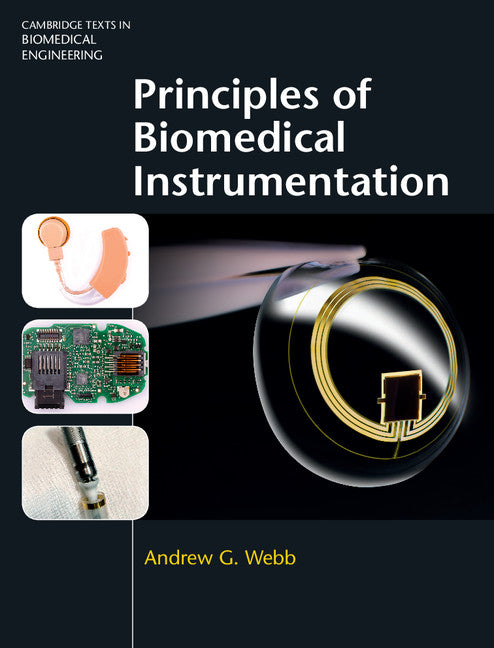Freshly Printed - allow 8 days lead
Couldn't load pickup availability
Principles of Biomedical Instrumentation
An up-to-date undergraduate text integrating microfabrication techniques, sensors and digital signal processing with clinical applications.
Andrew G. Webb (Author)
9781107113138, Cambridge University Press
Hardback, published 11 January 2018
344 pages, 230 b/w illus.
25.3 x 19.2 x 1.9 cm, 0.9 kg
This accessible yet in-depth textbook describes the step-by-step processes involved in biomedical device design. Integrating microfabrication techniques, sensors and digital signal processing with key clinical applications, it covers: the measurement, amplification and digitization of physiological signals, and the removal of interfering signals; the transmission of signals from implanted sensors through the body, and the issues surrounding the powering of these sensors; networks for transferring sensitive patient data to hospitals for continuous home-monitoring systems; tests for ensuring patient safety; the cost-benefit and technological trade-offs involved in device design; and current challenges in biomedical device design. With dedicated chapters on electrocardiography, digital hearing aids and mobile health, and including numerous end-of-chapter homework problems, online solutions and additional references for extended learning, it is the ideal resource for senior undergraduate students taking courses in biomedical instrumentation and clinical technology.
1. Biomedical instrumentation and devices
2. Sensors and transducers
3. Signal filtering and amplification
4. Data acquisition and signal processing
5. Electrocardiography
6. Electroencephalograpy
7. Digital hearing aids
8. Mobile health, wearable health technology and wireless implanted devices
9. Safety of biomedical instruments and devices
Appendix. Safety policy documents.
Subject Areas: Circuits & components [TJFC], Biomedical engineering [MQW]


